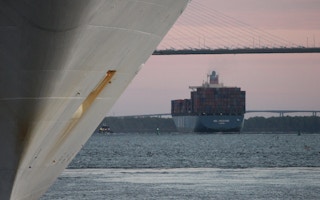Not only do women at sea need to deal with having less access to training and persistant perceptions of incompetence, they also have to face suggestive gossip and outrage of modesty on months-long voyages, according to an industry group report released on Thursday (27 April).
To continue reading, subscribe to Eco‑Business.
There's something for everyone. We offer a range of subscription plans.
- Access our stories and receive our Insights Weekly newsletter with the free EB Member plan.
- Unlock unlimited access to our content and archive with EB Circle.
- Publish your content with EB Premium.
The 35-member “All Aboard Alliance”, which includes major shipping firms such as Anglo-Eastern and Mitsui O.S.K. Lines, said the report represents an “important first step” to making seafaring careers better for women.
Seafaring is a heavily male-dominated sector. Only 1.2 per cent of sailors globally are women, according to the International Maritime Organization.
For the report, 115 women sailors – many of them from Asian countries like India and the Philippines – were asked about their experience on board ships, their ideas for improving work conditions and how many women they preferred to sail with.
The All Aboard Alliance, convened last May, said it identified 15 pain points from the interviews. It said sexual misdemeanours were “frequently brought up” by interviewees, despite there being no specific questions on the topic.
Respondents spoke of their experiences with harassment, indecent jokes and threats of demotion for not wanting to sleep with a captain. One seafarer suggested ships should have surveillance cameras in public areas. All interviewees in the report were anonymised.
The interviewees said they needed to watch their own interactions with crew members to avoid rumours and gossip. Some felt uncomfortable being the centre of attention when they were the sole female sailor on a trip; others felt isolated. Many said it was important to have female senior officers on board.
A separate, larger study by industry group Women’s International Shipping and Trading Association last year found that two-thirds of female seafarers experienced harassment and intimidation, and a quarter reporting that privacy intrusions are “common” on board ships.
All Aboard Alliance said one of the “most significant challenges” raised in its study was that women found it harder to succeed at work when they are treated as less competent and are assigned different tasks from men.
Respondents told of getting less feedback and on-the-job training, but having to work harder to be promoted. One sailor said she was “treated as a young girl”.
The feedback “rarely came across as a complaint, but more often as a matter-of-fact statement, a perceived inherent part of the industry”, the report said. It noted that multi-month assignments and the lack of maternity leave hindered career progression, while some companies did not want to hire women.
Respondents also spoke of having to bring sufficient sanitary products on long trips – which was especially challenging in the Covid-19 years when access to foreign shores was limited – and not having women changing rooms, bathrooms and laundry areas. Some had to wear ill-fitting protective gear in mens’ sizes, though All Aboard Alliance noted that a recent international convention had mandated this issue to be addressed by end-2024.
The alliance started exploring solutions to the identified issues last month, and said it will create guidelines for trial later this year. It said two workshops organised by parent organisation, non-profit Global Maritime Forum, involving sailors, company representatives and experts, yielded “promising new ideas and concepts”.
Susanne Justesen, project director for human sustainability at the Global Maritime Forum, said she saw sexual assault and harassment at sea as the more serious challenges highlighted in the report.
“We are not able to eliminate sexual harassment and assaults entirely, but we can most certainly find better ways to respond when they happen. Zero-tolerance measures, when implemented, are important means for preventing sexual misconduct,” Justesen said. She said the organisation is still in the process of designing solutions and would share when ready.
“We want gender diversity to be the norm, so our priority is to ensure a conducive work environment for women on board ships to ensure more women continue to join the industry,” she added.
The working environment for women seafarers was thrown into the spotlight last year, after high-profile rape and sexual harassment cases involving shipping giant Maersk and two cadets. The lawsuits were settled in November, though many details were redacted by mutual agreement. Five Maersk employees have been fired. The firm is not part of All Aboard Alliance.
Even before the Maersk incident, non-governmental and international groups have long been sounding the alarm on health, safety and welfare for female seafarers sailing the high seas, where avenues for scrutiny and accountability are limited.

















